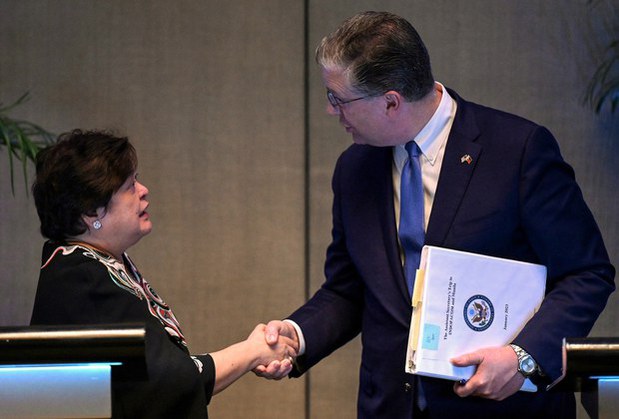US will not make Philippines choose sides over China rivalry
Share

Theresa Lazaro, the Philippine Foreign Affairs acting undersecretary (left), greets U.S. Assistant Secretary of State Daniel J. Kritenbrink after speaking to reporters following the 10th U.S.-Philippines Bilateral Strategic Dialogue in Manila, Jan. 20, 2023.
The United States, the Philippines’ oldest defense ally, will not ask Manila to choose sides in a perceived geopolitical rivalry with China, a senior American diplomat said Friday.
Manila should make decisions in its national interest, Daniel Kritenbrink, the U.S. assistant secretary of state for East Asian and Pacific Affairs, said as the two longtime allies reaffirmed a decades-old defense partnership amid Chinese challenges in the contested South China Sea.
“Everywhere I go I would be asked, ‘Are you trying to force us to choose between you and China?’ That’s not our game,” he said during a public forum organized by the U.S. Embassy at De La Salle University in Manila.
As a free nation, the Philippines can make decisions that benefit interests, said Kritenbrink, who was in Manila for the 10th Bilateral Strategic Dialogue. The two-day dialogue, which ended on Friday, serves as a forum for policy making between the two countries.
“We don’t want you to choose, we want you to have choices. We want you to be able to make your own decisions and free from coercion. If you can do that, we can do that, together we are better off,” Kritenrbink said.
Theresa Lazaro, the Philippines’ acting undersecretary of Foreign Affairs, joined Kritenbrink at the forum.
“The Philippines and the United States are in a very good place now and we had to meet to bring that relationship to even greater heights,” Lazaro said. “We agreed on several important initiatives that demonstrate our unwavering commitment to our alliance and partnership.”
Both Washington and its rival, Beijing, are competing for strategic and military influence in Southeast Asia, including the South China Sea where the Philippines and China are locked in a territorial dispute. Brunei, Malaysia, Vietnam and Taiwan also hold claims over parts of the sea, but Beijing claims up to 90% of the waterway.
During a state visit to Beijing earlier this month, President Ferdinand Marcos Jr. brought up allegations of Chinese harassment of Philippine fishermen in waters clearly within his country’s jurisdiction. China agreed to establish a hotline to avoid an escalation of tensions in the potentially mineral-rich sea region.
Marcos: ‘A friend to all’
On Wednesday, Marcos told World Economic Forum attendees in Davos, Switzerland, that while China had emerged as its most important trading partner, he was not about to choose sides.
“[S]ince the pandemic – the alliances between our neighbors have become very strong. For example, the biggest contributor for foreign direct investment now is Singapore into the Philippines,” Marcos said, according to transcripts made available to reporters in Manila.
“The Philippines is really a friend to all. We are not necessarily leaning toward the west or the east, that we’re very, very balanced in where we are positioned. I think that’s the right strategy,” he said.
In a joint statement after the dialogue in Manila, the Philippines and U.S. officials agreed to pursue cooperation for stronger partnership and alliance as well as to promote an “international law-based maritime order.”
“Reiterating the importance of maintaining and promoting an international law-based maritime order in the South China Sea, in accordance with UNCLOS and the 2016 Arbitral Tribunal decision, and recognizing the value of an integrated and comprehensive approach to addressing maritime issues,” the allies said.
UNCLOS refers to the United Nations Convention on the Law of the Sea. The U.S. has not ratified the law but recognizes UNCLOS as a codification of customary international law.
“The Philippines welcomed the offer of the United States to hold regular consultations with a view to identifying joint maritime activities that the two countries can undertake,” the statement said.
In 2016, Manila won its complaint against China before an international arbitration court, resulting in a ruling that invalidated Beijing’s sweeping claims in the South China Sea. Beijing has since ignored the ruling.
Friday’s announcement came on the same day Jose Manuel Romualdez, the Philippine ambassador in Washington, confirmed that the two nations plan to resume two-plus-two talks involving defense and foreign affairs officials. Responding to a request from BenarNews, the embassy said the countries are committed to resuming the talks this year.
In November, U.S. Vice President Kamala Harris visited Palawan, a southwestern Philippine island on the frontline of Manila’s territorial dispute with Beijing in the South China Sea.
She said that the U.S. was bound by the decades-old Mutual Defense Treaty to come to Manila’s aid should it be attacked.
On Friday, Kritenbrink reiterated Harris’ statement.
“I don’t think we need additional new agreements to carry out our commitment to the Republic of the Philippines under the Mutual Defense Treaty. And again, those commitments apply to Philippine Armed Forces in the South China Sea,” he told reporters.
Jojo Riñoza in Dagupan, Philippines, and Jeoffrey Maitem in Davao, Philippines, contributed to this report.







